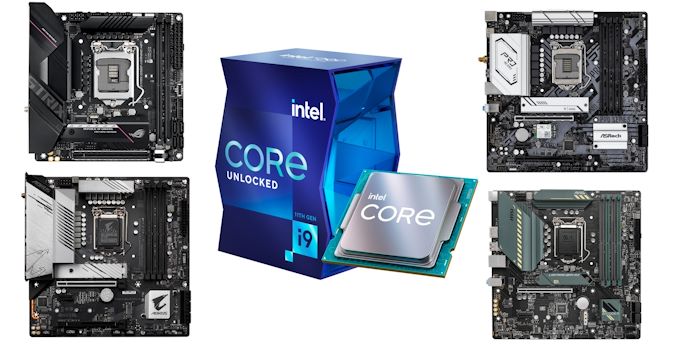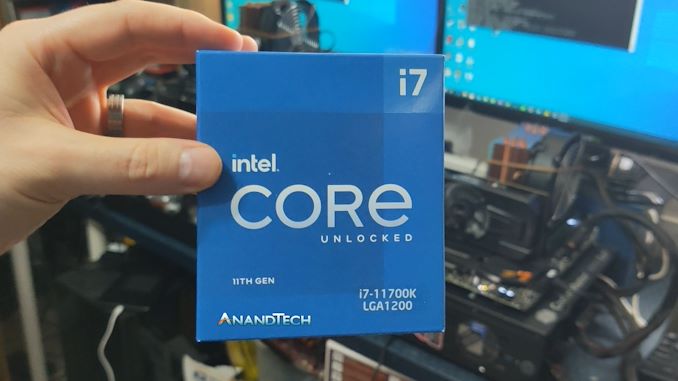Intel Rocket Lake (14nm) Review: Core i9-11900K, Core i7-11700K, and Core i5-11600K
by Dr. Ian Cutress on March 30, 2021 10:03 AM EST- Posted in
- CPUs
- Intel
- LGA1200
- 11th Gen
- Rocket Lake
- Z590
- B560
- Core i9-11900K
Conclusion
For anyone buying a new system today, the market is a little bleak. Anyone wanting a new GPU has to actively pay attention to stock levels, or drive to a local store for when a delivery arrives. The casual buyers then either look to pre-built systems (which are also flying off the shelves), or just hang on to what they have for another year.
But there is another way. I find that users fall in to two camps.
The first camp is the ‘upgrade everything at once’ attitude. These users sell their old systems and buy, mostly, all anew. Depending on budget and savings, this is probably a good/average system, and it means you get a good run of what’s available at that time. It’s a multi-year upgrade cycle where you might get something good for that generation, and hopefully everything is balanced.
The other camp is the ‘upgrade one piece at a time’. This means that if it’s time to upgrade a storage drive, or a memory kit, or a GPU, or a CPU, you get the best you can afford at that time. So you might end up with an older CPU but a top end GPU, good storage, good power supply, and then next time around, it’s all about CPU and motherboard upgrades. This attitude has the potential for more bottlenecks, but it means you often get the best of a generation, and each piece holds its resale value more.
In a time where we have limited GPUs available, I can very much see users going all out on the CPU/memory side of the equation, perhaps spending a bit extra on the CPU, while they wait for the graphics market to come back into play. After all, who really wants to pay $1300 for an RTX 3070 right now?
Performance and Analysis
In our Core i7-11700K review, our conclusions there are very much broadly applicable here. Intel’s Rocket Lake as a backported processor design has worked, but has critical issues with efficiency and peak power draw. Compared to the previous generation, clock-for-clock performance gains for math workloads are 16-22% or 6-18% for other workloads, however the loss of two cores really does restrict how much of a halo product it can be in light of what AMD is offering.
Rocket Lake makes good in offering PCIe 4.0, and enabling new features like Gear ratios for the memory controller, as well as pushing for more support for 2.5 gigabit Ethernet, however it becomes a tough sell. At the time we reviewed the Core i7-11700K, we didn’t know the pricing, and it was looking like AMD’s stock levels were pretty bad, subsequently making Intel the default choice. Since then, Intel's pricing hasn't turned out too bad for its performance compared to AMD (except for the Core i9), however AMD’s stock is a lot more bountiful.
For anyone looking at the financials for Intel, the new processor is 25% bigger than before, but not being sold for as big a margin as you might expect. In some discussions in the industry, it looks like retailers are getting roughly 20%/80% stock for Core i9 to Core i7, indicating that Intel is going to be very focused on that Core i7 market around $400-$450. In that space, AMD and Intel both have well-performing products, however AMD gets an overall small lead and is much more efficient.
However, with the GPU market being so terrible, users could jump an extra $100 and get 50% more AMD cores. When AMD is in stock, Intel’s Rocket Lake is more about the platform than the processor. If I said that that the Rocket Lake LGA1200 platform had no upgrade potential, for users buying in today, an obvious response might be that neither does AM4, and you’d be correct. However, for any user buying a Core i7-11700K on an LGA1200 today, compared to a Ryzen 7 5800X customer on AM4, the latter still has the opportunity to go to 16 cores if needed. Rocket Lake comes across with a lot of dead-ends in that regard, especially as the next generation is meant to be on a new socket, and with supposedly new memory.
Rocket Lake: Failed Experiment, or Good Attempt?
For Intel, Rocket Lake is a dual purpose design. On the one hand, it provides Intel with something to put into its desktop processor roadmap while the manufacturing side of the business is still getting sorted. On the other hand it gives Intel a good marker in the sand for what it means to backport a processor.
Rocket Lake, in the context of backporting, has been a ‘good attempt’ – good enough to at least launch into the market. It does offer performance gains in several key areas, and does bring AVX-512 to the consumer market, albeit at the expense of power. However in a lot of use cases that people are enabling today, which aren’t AVX-512 enabled, there’s more performance to be had with older processors, or the competition. Rocket Lake also gets you PCIe 4.0, however users might feel that is a small add-in when AMD has PCIe 4.0, lower power, and better general performance for the same price.
Intel’s future is going to be full of processor cores built for multiple process nodes. What makes Rocket Lake different is that when the core was designed for 10nm, it was solely designed for 10nm, and no thought was ever given to a 14nm version. The results in this review show that this sort of backporting doesn’t really work, not to the same level of die size, performance, and profit margin needed to move forward. It was a laudable experiment, but in the future, Intel will need to co-design with multiple process nodes in mind.












279 Comments
View All Comments
29a - Tuesday, March 30, 2021 - link
No iGPU tests?Alistair - Tuesday, March 30, 2021 - link
Quote from Ars Technia: Rocket Lake-S gets a small but noticeable upgrade to its integrated graphics performance—the 10th-generation Core CPU's UHD 630 graphics gets bumped up to UHD 750. While it is an improvement, it's nothing to write home about—if you were hoping for an equivalent to Intel's Iris Xe graphics in Tiger Lake laptop CPUs (or AMD's Vega 11 in desktop APUs) you'll be sorely disappointed.A modest GeForce GTX 1060 is good for a Time Spy Graphics score of roughly 4,000. Intel's flagship i7-1185G7 laptop CPU manages nearly half that at 1572, with AMD's Vega 11 lagging noticeably behind at 1226. Rocket Lake-S' UHD 750 comes in at a yawn-inducing 592—a little less than half the performance of Vega 11 and a little more than one-third the performance of Iris Xe.
KaarlisK - Tuesday, March 30, 2021 - link
Also, notice that i5 11400 has UHD Graphics 730, which has less EUs (24 not 32). So with the cheapest i5 (10400->11400) there may actually be a regression in iGPU performance.Hifihedgehog - Tuesday, March 30, 2021 - link
Sounds like even on as advanced a process as 14nm+++++++++++++++++++++++++++++++++++++ that yields aren't exactly that spectacular then for this backport.tipoo - Tuesday, March 30, 2021 - link
Well density definitely isn't.III-V - Tuesday, March 30, 2021 - link
Why in the world would you come to that conclusion?firewolfsm - Wednesday, March 31, 2021 - link
Because Intel generally hasn't had to cut the IGP for i5 models in the past. The cut indicates they're producing chips with bad EUs.KaarlisK - Wednesday, March 31, 2021 - link
In the past, they could offload half-funcioning GPUs to Pentiums and Celerons. There are no Rocket Lake i3s even...Alistair - Tuesday, March 30, 2021 - link
I was bored, so I went and bought the i5-11500 just to test Intel Xe haha. I'll post benchmarks later.Alistair - Tuesday, March 30, 2021 - link
Ok it gets ~40 fps in Overwatch at 1080p, and ~100fps at 50 percent of 1080p (scaling at higher resolutions is bad with DDR memory). Ouch. Not great. Usable, but not great. This is with very fast memory. DDR4 3600 C16.Now I'm going to try Runeterra.